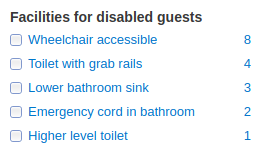We don’t have that many startup postmortems coming from the middle east. Here is one.
Backstory
We started Ekshef in 2011 fresh out of college. I started it with other four co-founders. Our goal was to build an online booking service for doctors similar to what’s currently Vezeeta. The main motive for me was to solve the problem of finding and booking doctors, since I spent countless hours of my life in doctors’ clinics, and in my parents’ car while waiting for my turn.
We joined Flat6Labs cycle 0 (the very first cycle). And after some ups and downs, we stopped working on Ekshef in 2013/2014. By the time of this writing, all the founders (with the exception of one) are outside of Egypt, and most of the people we worked with during that time are also currently outside of Egypt.
Since I have been getting some inquiries on what happened, and why it didn’t work. I decided to answer this once and for all. Before you proceed please note that this is my perspective, and other involved stakeholders might have different opinions.
Wrong Problem
We wasted a lot of time trying to solve the wrong problem. We thought if we solve the appointments problem for patients everyone would be happy. We realized that doctors don’t give a shit about organizing their appointments. In fact, some doctors even like having their clinics busy and full, because it is an indicator for many Egyptian customers of how popular – which means good – is this doctor.
We later realized the biggest pain for patients is actually finding out the good doctors. I still believe this is the main pain point in Egypt. People still ask their mom, their neighbor, or their friends for doctor recommendations. When we realized this we started building a social recommendations engine. The idea was you login to Ekshef using your Facebook account, then you would have two options 1) Recommend a doctor to your FB friends. 2) Ask for doctor recommendations. Back then, Facebook APIs allowed pulling all of the users’ friends (hello Cambridge Analytica). We were one of the beneficiaries of this feature and were using the social graph to help users recommend doctors to each other. This feature had moderate success, we could’ve optimized it more but we ran out of funding and lost hope before managing to get there.
Inexperience
We were naive and fresh out of college. We had a great technical team that could build anything. This led us to build a crazy search engine that would allow you to search for doctors with any way. Location, specialty, price, opening hours, you name it. To make it more crazy, I wasn’t satisfied by most of the services that provide Arabic search, including Vezeeta. Omar El Mohandes, who was working with us at the time and currently working at Amazon based in London implemented the Soundex search algorithm for Arabic. This algorithm allows you to search for any Arabic word without having to worry about the different versions the word. احمد = أحمد. Not only this, Omar did some improvements to make it detect typos. Yes, typos in Arabic names were still getting you the right doctor on Ekshef. Just like Google.
Another side of inexperience was dealing with those outside the company. We believed a lot of people that were lying to us. We had to no experience how to raise funds, and even our investors were inexperienced as much as we were with how the model should work. The general push was towards fund raising, but the company wasn’t really funding ready. The fund raising was based on totally unrealistic financial models that make no sense for a pre-market fit, pre-revenue company. We didn’t know it, our investors didn’t know it, and the people we were trying to raise funds from didn’t know it. It was like a group of blind people trying to identify the elephant in the room.
Wrong timing
When we started in 2011, internet and smartphone adoption wasn’t at the same level it is at now. Doctor assistants didn’t have smartphones. They didn’t know how to use a computer or the internet. Facebook and twitter weren’t as popular. People were downloading a game such as subway surfer by sending a 5 EGP message to get a link to the game on Google play store. And amidst all this, we were naively thinking the uneducated doctors assistants will use our system to organize appointments.
Add to this the political instability, and the fact that none of us had to stay and work in Egypt. We all decided one after another that it is not worth it, and everyone left to join a company abroad (Google, Amazon, Booking…etc).
Final Remarks
Ekshef experience shaped me in many ways. I have countless stories from these days. I met many great people that put their trust in me and helped me a lot. I have made good friends and was surrounded by some of the smartest people I know. I also had my flaws. I apologize for anyone I hurt or screwed up with. And I hope they forgive me.
As for my opinion on starting a startup in Egypt. I am extremely bearish on Egypt and don’t see it as a fertile ground for anything meaningful to come out of it.
There is a lot of inefficiency that makes any optimization problem impossible. There are basics that don’t exist such as logistics and payments infrastructure. There is an unavoidable brain drain that makes scaling an engineering organization super hard. And last but not least, building a successful company is a decade worth of effort with low probability of success, and with the current currency situation the economics don’t work compared to having a stable dollar/euro paying job abroad.
I hear you saying but look at Instabug and Wuzzuf. Those are exceptions to the rule. We are yet to find their final outcome. Even with the successes they have, they are at risk of losing everything and going back to zero. And still, those are exceptions in a country that’s failing by any objective measures.
I hope I am wrong.






